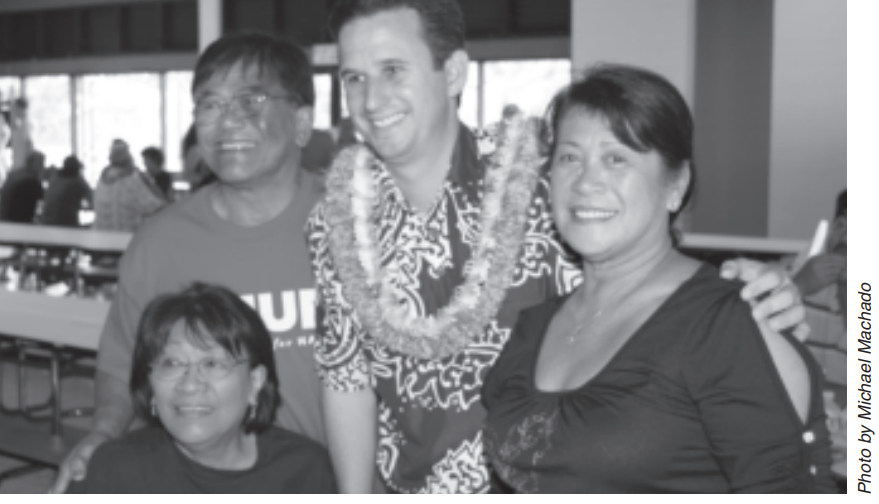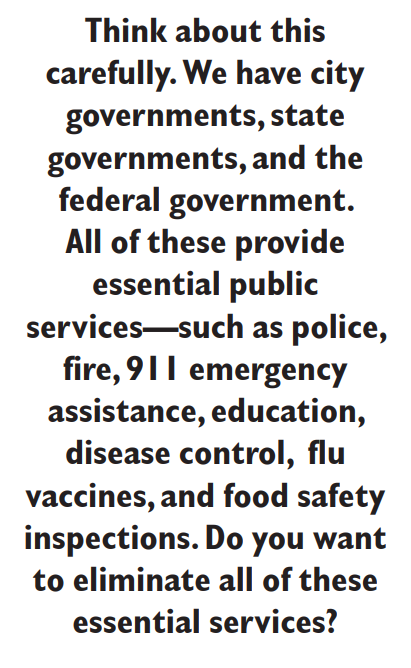
ILWU endorsed candidate Brian Schatz with Lanai ILWU members at Maui’s Labor Day celebration on September 6, 2010. Labor Day is meant to be a holiday for workers and a public display of the unity, strength, and spirit of the labor movement.
Republican attacks on government are attacks on you
Republican Party candidates say taxes are too high and government is too big. They want to cut taxes, cut government, and cut regulation on business.
These attacks on “government” are a tricky form of propaganda intended to deceive and mislead the public. “Government” is a word with many meanings but they try to link everything negative about our political system to “government.”
Think about this carefully. We have city governments, state governments, and the federal government. All of these provide essential public services— such as police, fire, 911 emergency assistance, education, disease control, flu vaccines, and food safety inspections. Do you want to eliminate all of these essential services?
Nearly all government regulations were made only after it was found that private businesses were cheating, lying, and injuring the public with false advertising, unsafe products or contaminated foods. Many government regulations make it possible for business to operate and protects honest and reputable companies. Do we want to do away with regulations that prohibit dangerous and dishonest business practices?
This August, hundreds of people have been sickened by salmonella poisoning and 500 million eggs were recalled. Inspectors found numerous health code violations at these egg farms. Earlier this year, hamburger and lettuce were recalled due to E. Coli contamination.
These recalls are taking place even with government food inspections and health code rules in place. Do we really want to do away with health and food safety regulations? Maybe we need to make stronger regulations and hire more food inspectors.

Oil disaster and pollution
The BP oil disaster and the death of 25 miners in the explosion at Massey’s West Virginia mine occurred even with federal rules and inspections. Both companies were cutting corners on engineering standards and violating safety rules. Government regulations requiring seat belts and air bags in automobiles saves an estimated 20,000 lives every year. Do we want to do away with government regulations that saves lives and protects our environment?
The financial crisis was caused because of the lack of financial regulation. It also appears that Republican President George W. Bush had cut the staffing of the government agencies that regulate and oversee these financial and banking companies.
Food safety, mine and oil rig safety, and financial regulations are already in place. The system of government regulations was not broken—it was deliberately crippled. The Republican Bush Administration acted on their desire to reduce government and eliminate the regulation of business. They did this in three ways: 1) Bush put people in charge of these agencies who were friends of the industry; 2) The newly appointed bosses relaxed or reduced enforcement of the regulations; 3) The new bosses cut the number of inspectors, stopped unannounced inspections or gave advance notice of inspections.
There are fewer food inspectors today while the output of meat and poultry producers have doubled to 104 billion pounds.
Pullman strike teaches workers they need political action
In 1893, a slowdown in the economy led to a drop in sales of the sleeping railroad cars built by the Pullman Palace Car Company in Illinois. George Pullman ordered the layoff of over 2,000 workers and a 25% wage cut of hourly employees. Managers were not included in the wage cuts.
Pullman workers lived in the company owned town of Pullman, Illinois. They rented their homes from Pullman and shopped in stores owned by Pullman. The workers’ wages were cut but the rent on their homes remained the same. The rent was taken out of their pay first, and many workers received only a dollar or less on pay day.
The remaining 3,300 Pullman workers who were members of the American Railway Union sent their negotiating committee to meet with the company on May 9, 1894. George Pullman told the committee the rent would not change, the wage cuts would stand, but he would look into complaints about the behavior of some managers.
The next day, the company fired three members of the union committee. The workers called a mass meeting, voted to strike to protest the wage cuts, and walked off the job. George Pullman refused to talk to the workers and left town to his summer home on the New Jersey seashore.
In June, at the American Railway Union’s national convention, the union authorized a nation-wide boycott if efforts to settle the strike with Pullman management failed. Pullman refused to talk to the union and on June 26, 1884, all union members would keep the U.S. mail moving but leave the Pullman cars on the sidetracks. If any worker was fired or disciplined for supporting the boycott, all railroad workers would walk off the job.
Boycott spreads
Within days, 50,000 railroad workers joined the boycott on 24 railroads serving the Chicago area. The managers of the 24 railroads met and agreed to support the Pullman Company by deliberately hooking Pullman cars to mail trains. This delayed U.S. mail delivery and the railway owners used their political influence to use the power of the federal government against the workers.
On July 2, 1894, the Attorney General Richard Olney, a former railroad attorney, got a court injunction against the strike for interfering with the delivery of U.S. mail.
On July 4, 1894, President Grover Cleveland declared the strike a federal crime and sent 12,000 U.S. marshals and federal troops to the town of Pullman, Illinois to break the strike and force the workers to return to their jobs. Some 13 workers were killed and 57 wounded before the strike was ended. Union leaders were arrested, the American Railway Union was dissolved, and Pullman workers had to sign pledges they would never again join a union.
American Railway Union president Eugene V. Debs and other union leaders were found guilty and sent to prison. The railway owners used their political influence with government against the workers and their union. While in prison, Eugene Debs concluded that labor needed to win political power to match that of the employers.
The Pullman strike taught the labor movement a powerful lesson. Unions began to mobilize their members to vote for union friendly politicians and to vote anti-labor politicians out of office. Unions used their growing political power to make Labor Day a holiday in cities, then in states.
Over the years, union political action succeeded in passing laws for workplace safety, minimum wages, unemployment insurance, non-discrimination laws, and much more.
Public outrage
Unions weren’t the only ones angered by the use of the federal government to serve the interest of the rich and powerful railway owners.
Illinois Governor John P. Altgeld was incensed at Cleveland for using federal troops to serve the interests of employers and for rejecting Altgeld’s plan to use state militia to keep order. At the Democratic Party Convention in 1896, Altgeld used his influence to block the nomination of Grover Cleveland for a second term as president. Instead, the Democratic Party nominated the more liberal William Jennings Bryan as their presidential candidate.
Republican William McKinley defeated Bryan to win the 1896 election. McKinley raised and spent $3.5 million in his campaign compared to $700,000 by Bryan. The $3.5 million spent by McKinley was an enormous sum of money and is equal to $3 billion today. McKinley was re-elected in 1900 and assassinated in 1901.
Link to Hawaii’s annexation
Grover Cleveland believed the overthrow of the Hawaiian monarchy was illegal. He withdrew a treaty of annexation signed by out-going President Benjamin Harrison and appointed James Blount to investigate the events in Hawaii. Blount found the U.S. minister to Hawaii had acted improperly and ordered that Queen Lili‘uokalani be restored to power. Sanford Dole and the Provisional Government of Hawaii refused and proclaimed Hawaii a republic in 1894.
In 1896, due to his use of federal troops against Pullman workers, Cleveland failed to win the Democratic Party nomination for another term as president. The Party nominated William Jennings Bryan who lost the election to Republican William McKinley.
McKinley was inaugurated as President in March 1897 and reversed Cleveland’s policy on Hawaii. McKinley favored bringing Hawaii under the control of the United States. In 1898, McKinley signed the “Newlands Resolution” which made Hawaii a Territory of the United States.
